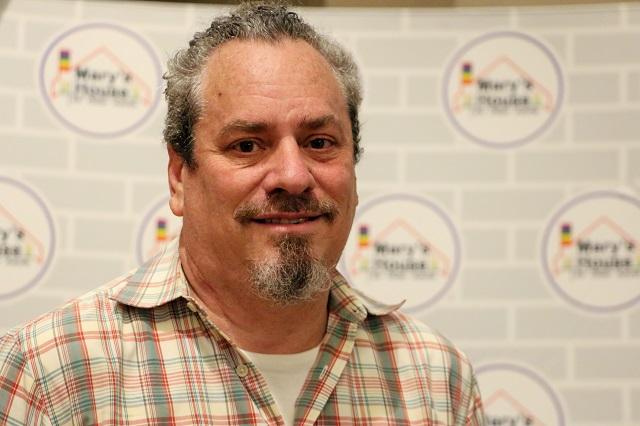For over 20 years, George Kerr III has helped lead the Washington DC-area struggle for HIV/AIDS prevention, treatment, and dignity for persons living with the diagnosis. As an elder for Westminster Presbyterian Church in Washington and co-monitor of the Presbyterian AIDS Network, Kerr performs his advocacy and service from a faith perspective.
At Westminster, Kerr helped found and direct START (Syringe Training Advocacy Resources and Treatment), which serves active and recovering drug users. He now leads his own social justice advocacy organization, G III Associates. Faith in Healthcare is grateful that George Kerr is the latest faith community advocate to join us for a Five-Question Interview:

1. What do you consider to be the most important work that you do?
My current work is focused on two populations: LGBTQIA+ seniors and persons struggling with substance abuse.
As for LGBTQIA seniors, and I am in that population, no one is really talking about our unique needs as we age. The result is that sometimes we have to go back in the closet to access housing and services. I serve on the board of directors and chair the policy, advocacy, and outreach committee of Mary’s House for Older Adults, where we are working to create independent, communal housing for older adults regardless of sexual/gender identity or orientation.
Persons affected by substance abuse are marginalized in a similar way, as I certainly saw in my time with START. I am now on the community advisory board for the DC Center for AIDS Research (DC CFAR), where we are looking at the broader health needs of these persons, which are often ignored, and working hard to reframe this challenge as a human rights issue.
- What motivates you to do your work?
This is not an abstract, policy-only issue for me. Over the course of my experiences for the past several decades, I have personally met and worked with hundreds of persons going through these struggles in both the LGBTQIA senior community and among persons who are active or recovering drug users. Knowing them personally means I have empathy for them, and I see their needs first-hand. After all that, I feel it is my responsibility to be an advocate.
- What are the biggest challenges you face?
The community is not fully aware of all the unmet needs, and as a result there is a lack of resources for persons who need them. Beyond just a need for resources, our approach to these persons is often off base. At our places of worship in particular, we expect people to come to us, especially those who with substance abuse problems. But that does not happen without trust, and trust comes from multiple contacts and is built over time.
So, we need to meet people in need where they are at. By that, I mean not just meeting them physically where they are, but also connecting with them in a non-judgmental way. We need to listen more and better. Often, when a person with needs is talking, we are coming up with solutions or our next question. Stop and just be in the moment and listen to them. They may just need an opportunity to share what their needs are, and to talk through their challenges.
- What do you think the U.S. healthcare system should look like?
We need to have healthcare for all, so we can all get the care and medicines we need. But what I have learned in this work, and as a healthcare patient myself, is that this can’t just be a slogan for a one-size-fits-all system. Each one of us has unique needs, and those needs begin with being treated with respect and dignity.
- What role do you see people of faith and faith communities playing in making the needed changes?
I have been privileged to serve in a range of roles in faith-related healthcare, and they include both direct service and advocacy for an improved system. I’ve been a patient, too. Based on all that, I think at this time in history people of faith need to raise our voices about what this country should look like.
With a critical election coming up, do we want to continue down the road of hate and me-first policies, or do we want to turn the page and be a country that has empathy and compassion for everyone? We know which choice our faith tells us is the right one.
Faith and Healthcare Notes
Who Thinks Medicare for All Makes Economic Sense? Over 200 Economists. “Health care is not a service that follows standard market rules. It should therefore be provided as a public good,” 209 economists wrote in an open letter to the American people endorsing Medicare for All legislation. “Evidence from around the world demonstrates that publicly financed health care systems result in improved health outcomes, lower costs, and greater equity.”
Your Millions or Your Life: New Drug to be Priced at $2.1 Million. Speaking of not following market rules, last week the pharma company Novartis set a $2.1 million price for a newly-approved Spinal Muscular Atrophy drug Zolgensma. “Novartis is forcing families to answer one question: ‘What are you willing to pay to save your child’s life?’ says David Mitchell, a cancer patient and the founder of Patients For Affordable Drugs. “But that’s the wrong question. We don’t pay a heart surgeon $2.1 million every time she repairs a congenital defect at birth . . . Novartis picked a price simply based on what it thought it could get away with.”
For-Profit Insurance Corporations Blocking Mental Health Treatment. “The U.S. is in the midst of a mental health crisis.” Bloomberg Businessweek reports. “Even so, insurers are denying claims, limiting coverage, and finding other ways to avoid complying with the law.” The report cites red tape problems and misleading information about a lack of in-network providers—all of which limit care and benefit the bottom lines of the corporations.
